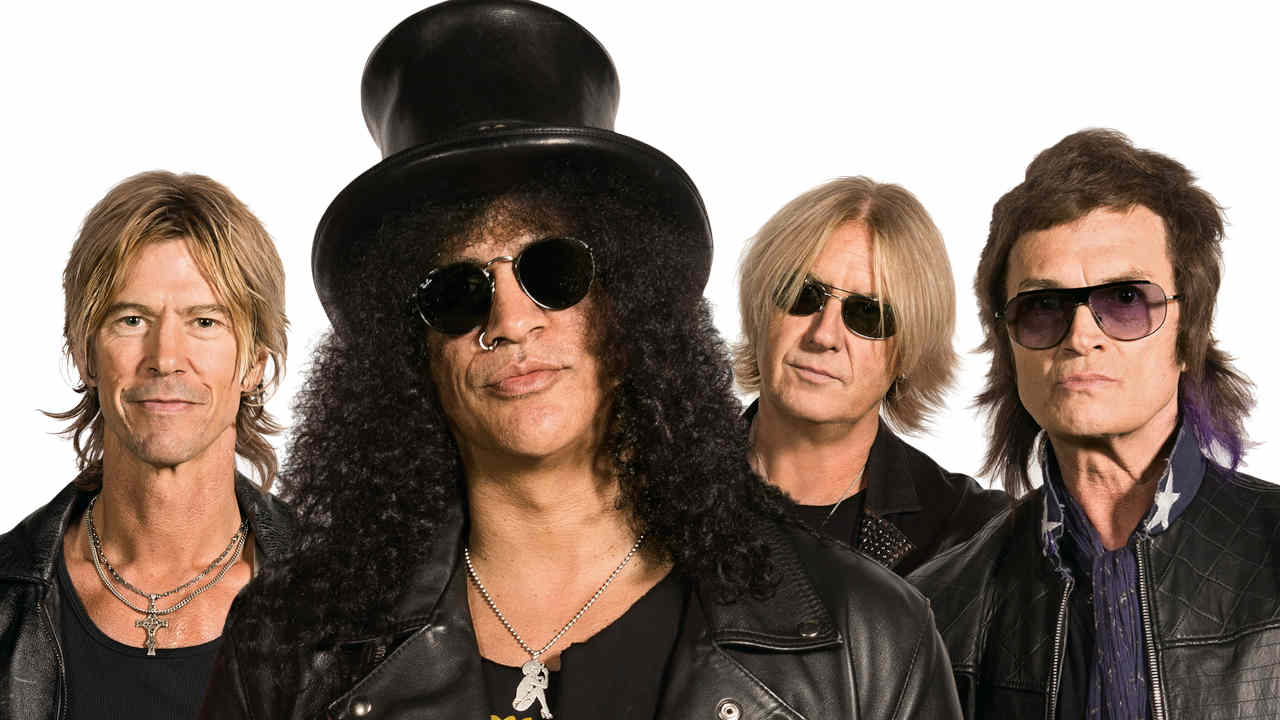It’s not until halfway through the first of Kings Of Chaos’s two shows at the GrandWest Arena, a 7,000-capacity venue-cum-casino complex in the northern suburbs of Cape Town, that you realise just how much money is up there on stage.
It’s June 7, 2013, and up until now, the nine members of this all-star collective have had a shift system in operation. As one of the four singers or three guitarists leaves the stage, another comes on to replace him. So far they’ve rattled through a jukebox-worth of hits from their various parent bands, prompting the sort of feverish audience reception that went out with cowboy boots and MTV.
But now they’ve taken things down a notch. The lights have been dimmed, and a pair of sofas, a couple of comfy armchairs and a fetching standard lamp have been wheeled on stage for a six-song acoustic section. It’s only now, as they sit in a semi-circle, soaking up the faux-living-room vibe, that the full line-up appears together for the first time.
There’s former Deep Purple man Glenn Hughes looking dapper, and Def Leppard’s Joe Elliott looking rock star-y. There’s Alter Bridge’s Myles Kennedy, parachuted in as a last-minute addition, and Ed Roland of platinum-plated post-grunge heroes Collective Soul – a familiar face to this crowd. There’s Velvet Revolver guitarist Dave Kushner, rocking a beanie hat and bull-horn moustache combo. And then there’s four members of Guns N’ Roses’ Use Your Illusion touring line-up: Slash, Duff McKagan, drummer Matt Sorum and guitarist Gilby Clarke.
As far as rock’s fantasy football league goes, Kings Of Chaos are definitely in the upper half of the Premier League. Between them they’ve sold upwards of 200 million records, generating the kind of wealth that could bankroll the lifestyle of a modestly ostentatious Central American dictator. The songs they play tonight – Sweet Child O’ Mine, Paradise City, Pour Some Sugar On Me, Smoke On The Water, Communication Breakdown – have soundtracked bars, bedrooms and halls like this for decades. Depending on your view of this sort of thing, Kings Of Chaos are either the most high-profile covers band on the planet, or the world’s first billion-dollar supergroup.
Duff McKagan is a little more modest about it all. “It’s Def Leppard plus Guns N’ Roses plus Deep Purple,” he says. “That’s some line-up, right?”
It’s hard to argue with that.
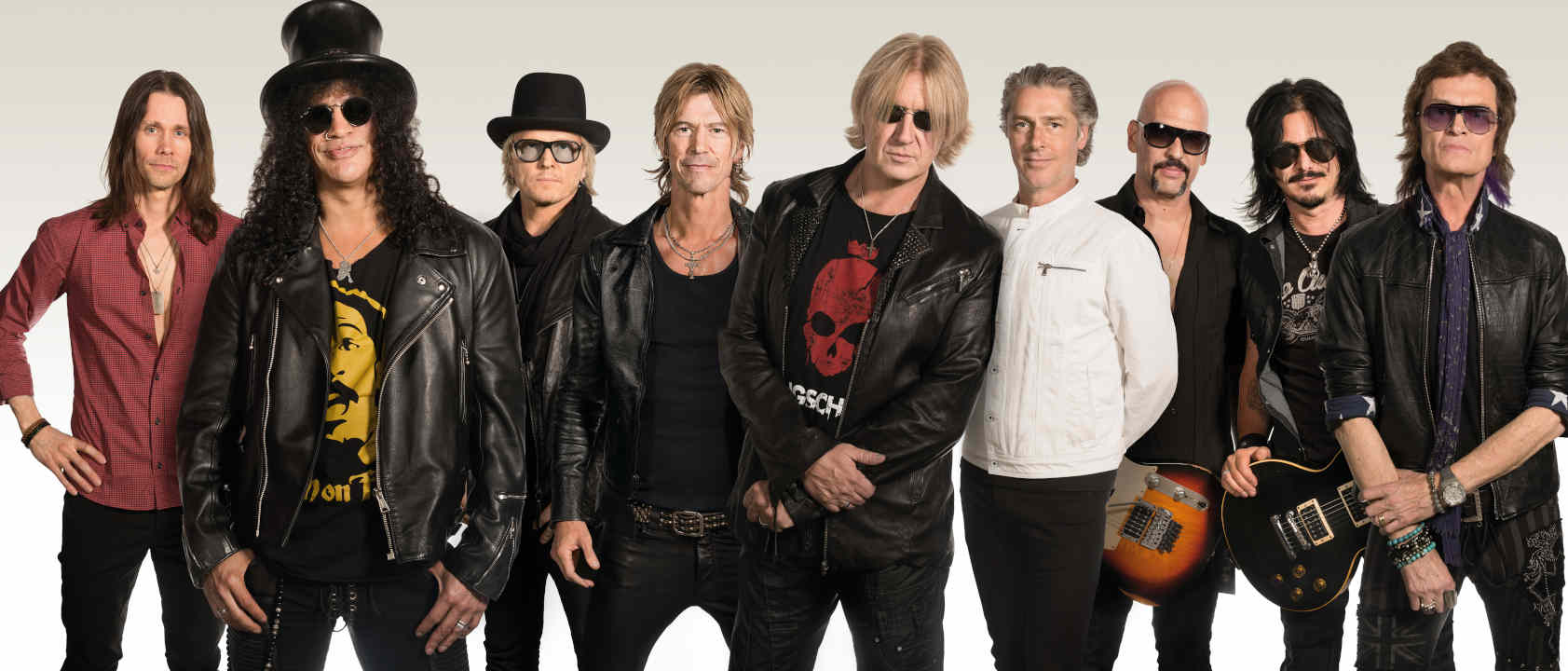
It’s not quite The Land That Rock Forgot, but South Africa certainly isn’t a regular stop‑off on the international touring circuit. The logistics of getting a band here are complicated and costly: a flight from London takes 11 hours, the trek from Los Angeles is closer to 30. The lack of extensive touring options in this part of the world means it’s only the megabands – your Metallicas, Linkin Parks and Red Hot Chili Peppers – who can afford to play here.
But it’s worth the journey, if only for the experience of being in one of the most unique places on the planet. Cape Town itself is a sprawling city that lies baking in the sun on the country’s western seaboard. Its most notable feature is Table Mountain, a 3,000-foot-high lump of rock dumped inconveniently in the middle of the city. While the country came in from the cold in the mid-90s, the scars of apartheid still remain, in both the townships that line the road from the airport, and the tin-roofed shacks – unauthorised, and barely inhabitable – that have sprung up throughout town. Conversely, where there is wealth it’s in plain view: lavish houses and multimillion-rand apartments cling to the beaches.
Tellingly, every house has barbed wire to keep unwanted intruders out. If that doesn’t work, then the guns that the majority of their owners keep in their homes generally do the trick. There are a lot of places you wouldn’t want to go in Cape Town after dark; there are quite a few you wouldn’t want to go to in broad daylight. When the band travel from their hotel to the venue, it’s in a convoy of people carriers with a retinue of security guards. This is partly for convenience, but partly for safety. “There are a lot of valuables in those cars,” says one of the band’s entourage, referring band members rather than their jewellery.
Only two of the nine musicians who make up the Kings Of Chaos have been to this part of the world before: Def Leppard played South Africa back in 1997, while Ed Roland has visited the country with Collective Soul and as a solo artist. Even Guns N’ Roses never made it here during their early-90s heyday, though that was less to do with their views on apartheid than with the fact that they couldn’t be arsed.
“We talked about it,” says Slash, with signature nonchalance. “Like, ‘We should do it, just to piss people off.’ [Shrugs] But it never happened.”
But that was then, and this is now. Gone are the days of Queen copping enormous amounts of flak for playing the infamous Sun City complex (ironically, where Kings Of Chaos will play two shows the following weekend); these days South Africa is very much open for business to international bands. And in an era when even the most successful are finding it hard to shift records and not much easier to sell tickets, the concept of a group of established musicians joining forces and taking the resultant roadshow to the less travelled-to parts of the world is a no-brainer, especially when there’s money on the table.
So what exactly are Kings Of Chaos? That’s a question the band themselves struggle to answer.
“It’s a conglomeration of various musicians,” says Duff McKagan, “playing songs by somebody who’s on that stage. It’s a bunch of guys who have earned their place in rock’n’roll.”
So it’s a covers band?
“[Thinks for a few seconds] Erm… naah, not really,” he says, unhelpfully.
If there’s a hub around which Kings Of Chaos revolves, then it’s Matt Sorum. It’s the ultimate drummer’s revenge: he’s the one who put the calls in, who calls the shots on stage, who even gets to pick the set-list. Joe Elliott – no stranger to this sort of thing with his own bands Down ’N’ Outz and The Cybernauts – calls Sorum “the boss”.
“I am the boss,” says Sorum, smiling as beatifically as only a Californian rock star can. He’s sitting in his tastefully appointed, ambiently lit Star Lounge (a dressing room, to you and me). “I’ve always tried to be the boss, I’ve just never figured out a way. Drummers always get stepped on and disrespected – you’re the guy at the back with no lighting.”
Sorum has previous form in this area: he’s a member of Camp Freddy, the covers band he founded a decade ago with guitarist Billy Morrison. But whereas Camp Freddy exist purely as a good night out for passing Sunset Strip celebrities, Kings Of Chaos are a much more serious – and lucrative – proposition.
“After everything went down with Velvet Revolver, I was, like, ‘Fuck, can I put another band together?’” he says. “It’s a fucking lot of work – you’re out on the road for nine months a year building a brand.”
Instead he talked to McKagan about joining forces for a low-key tour. “Then Duff said: ‘Why don’t we get a bunch of guys together, play our songs, have fun?’ I’m, like, that sounds cool – I can ask my friends, we can do a good run, get paid well, stay in nice hotels.”
And how did you decide who to invite along?
“I’ve got a past with a lot of these guys,” says Sorum, “which is a big part of the reason that I called them. I’ve got a pretty good sense of who is an asshole and who isn’t, and I know they’re not.”
He grins his Californian grin again. “The deal was: no drama, no bullshit, no arguments, no egos. Just come and play.”
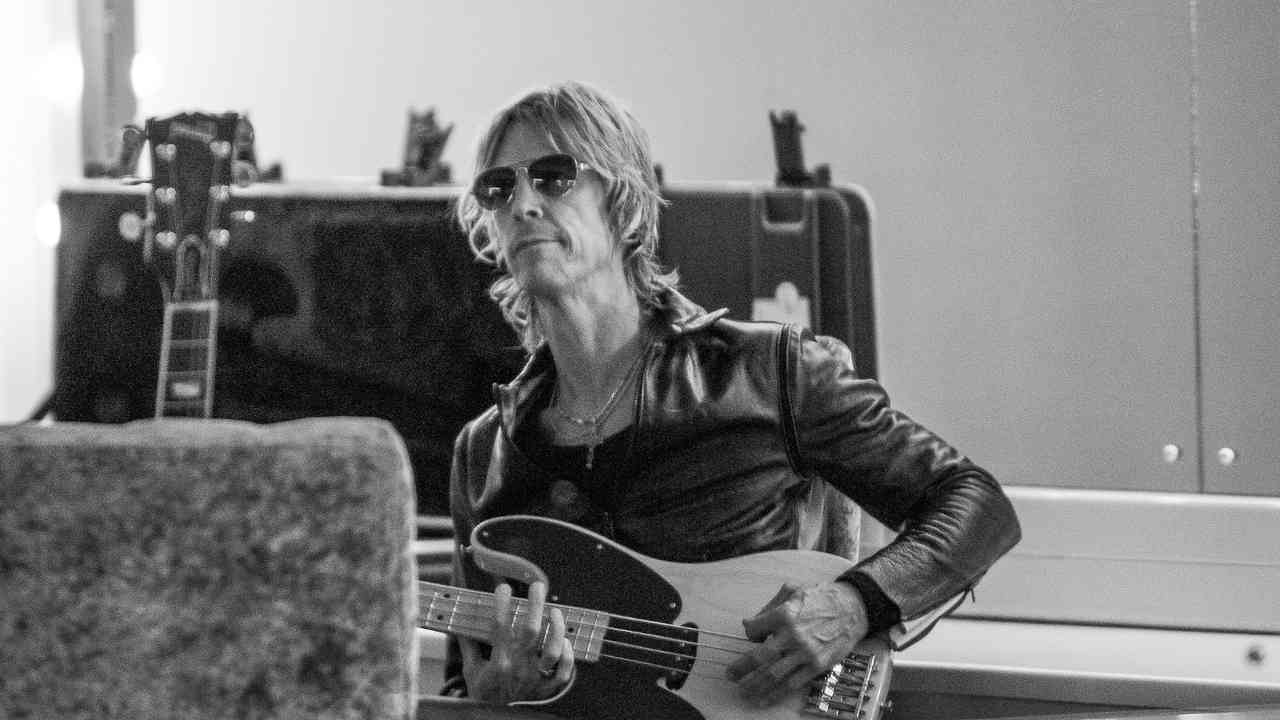
The name Kings Of Chaos has been rattling around Sorum’s brain for at least 15 years. He originally wanted to use it for the supergroup he formed in the mid-90s with McKagan, Sex Pistols guitarist Steve Jones and Duran Duran bassist John Taylor, but they went with Neurotic Boy Outsiders instead.
The irony is that Kings Of Chaos’s backstage area couldn’t be less chaotic if it had been set up by the Cape Town chapter of the Salvation Army. There’s barely a drop of booze around, let alone a whiff of drugs, though that’s hardly surprising given that at least a third of the musicians involved are recovering alcoholics or junkies (it says something about the state of rock’n’roll in 2013 when one crew member is overheard recommending cucumber and celery smoothies before bed – “great for the skin”, apparently).
What there is, is a tangible sense of camaraderie. If Sorum’s “no drama, no bullshit” line sounds glib on paper, in reality it seems to be close to the truth. Sorum and Slash are the only ones with their own dressing rooms. The rest are happily doubling up, or, in the case of Myles Kennedy, being ungraciously shoved to another floor of the building, but nobody seems to be throwing their toys out of the pram about it.
At one point I poke my head into the Green Room and see Slash, McKagan, Gilby Clarke and Dave Kushner huddled around on sofas, playing an acoustic Knockin’ On Heaven’s Door. At the same time, two doors away Joe Elliott is guiding Glenn Hughes through the harmonic nuances of Animal.
“Come on in,” booms Elliott when they’re done. “Welcome to the warble boys’ room. They tried to shove us upstairs, but I was like, ‘Er, no thanks. Myles Kennedy can have that one.’”
The Yorkshireman came on board early with this. He’s known Guns N’ Roses properly since they met at the Freddie Mercury tribute concert in 1991. When Sorum called to see if he was interested, Elliott jumped at the opportunity.
“He said: ‘Do you want to jump on board this little crazy train? It should be a lot of fun,’” says the singer. “That was the bit that popped out: ‘fun’. It’s spontaneous.”
Elliott is keen to push the ‘fun’ aspect of all this, and he’s not the only one: Sorum and McKagan say exactly the same, independently of each other. “Fuck yeah,” says the bassist. “It’s exceedingly fun.”
But their first attempt at it looked a lot less than fun. Last year, with Gene Simmons, Sebastian Bach and Cult guitarist Billy Duffy in tow, they flew to South America for a short tour under the name Rock And Roll All Stars. They were scheduled to play 10 shows. They ended up playing just four. The fact that Sorum was effectively managing the band himself didn’t help matters, but it was ultimately an unvarnished debacle.
“It was classic,” says Elliott. “We were on an old 70s aeroplane with a 70s promoter who did all the things that 70s promoters do. The promoter didn’t sort out the local promoters properly. They weren’t going to pay us. And if they weren’t going to pay, we weren’t going to play.”
From the outside, the experience did them no favours. At best it was perceived as a bunch of rich rock stars topping up their tans and pocketing a presumably healthy fee for their trouble; at worst it was a cynical cash-grab away from the spotlight. Elliott knows this is coming, and he’s got a ready-made defence.
“People who slag us off for doing this are totally missing the point,” he says. “We’re doing it because it’s a chance to do something different. You’re stepping out of your hamster wheel and maybe bringing something back to the day job. It’s not like we need the money.”
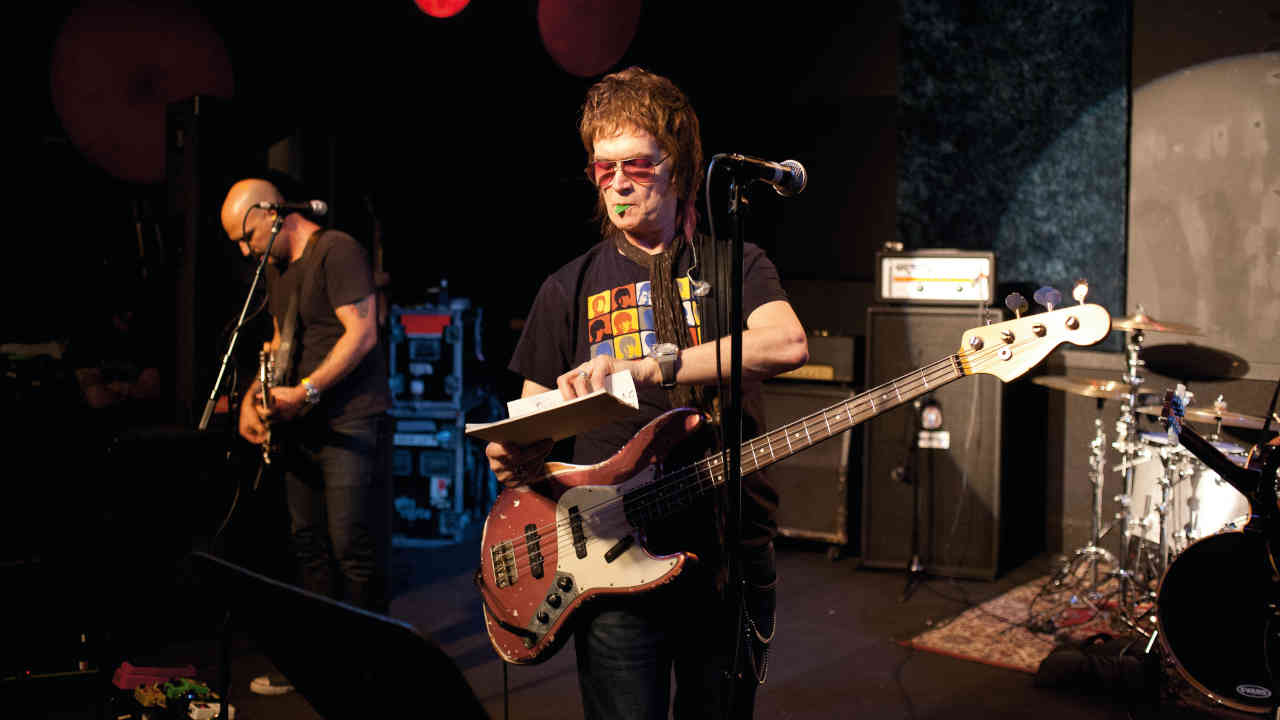
There’s no chance of a repeat of the South American debacle here. The man who brought the band over is Andy MacPherson, a superhumanly friendly Cape Town native who juggles his duties as a promoter with his role as a musician. He knows this is as important for the South African live scene as it is for the band themselves.
“We don’t get every band coming here for whatever reason,” he says. “But if these guys go back and tell other bands and musicians that they had a great time playing in South Africa, then hopefully that means more bands will come over.”
MacPherson ensures the band get the A-list treatment while they’re here. On their day off, he organises a trip to the top of Table Mountain, which is accessed by a vertiginously steep cable car. This is followed by an extravagant lunch at a five-star beach lodge, itself only accessible by a mountainside road that winds terrifyingly several hundred feet above the ocean. Neither are for the faint of heart: one weak cable car line or a sudden puncture and several million dollars’ worth of rock star would plummet instantly to their death.
Of course, there are still the mundane realities that come with being in a touring band to deal with, and even multi-millionaire rock stars can’t escape the pre-show soundcheck. Ever the chief, Sorum leads from the back while various musicians and crew members troop on and off stage muttering barely comprehensible tech-speak about pedals and monitor levels.
At one point, Sorum struggles to get his head around the ending of Def Leppard’s Animal. Patiently, Elliott guides him through it as Duff McKagan looks on. At this point you realise just how surreal this is: it’s Def Leppard with Guns N’ Roses’ rhythm section.
“It was a little strange for us too,” McKagan says an hour later, his voice echoing around the sitting area in the large, starkly lit dressing room he’s sharing with his former GN’R bandmate Gilby Clarke. “When would I ever have imagined that I’d be playing Animal?”
There’s a clubbable element to it all. The core of the band, Hughes excepted, are from roughly the same generation, and dominated rock at roughly the same time. You can’t help wonder what this would have been like if it had happened back then.
“If we’d have done this 25 years ago then, yeah, it might have had a different vibe,” says McKagan. “But then this probably wouldn’t have happened 25 years ago, we all had our own things going on.”
Of course, everybody here still has their own thing going on. Which is a logistical nightmare for the people actually trying to get nine musicians together in the same room. That task falls to Steve Wood, a charming, fast-talking ex-pat Brit now based in LA. Wood co-manages Alter Bridge, and he’s the man responsible for corralling the ‘talent’ into this venue on the other side of the world.
“Oh, it’s a nightmare,” he says breezily, only half joking, as we sit out the back of the venue and gaze through the guarded security gates. “It would be easy if none of these people did anything, but they’ve all got at least one band, some of them have two or three. Everybody has lawyers, agents, managers. There’s money involved, and people want to make sure their artist thinks they’re doing a good job for them.” He shrugs. “It’s a lot of work.”
Is that why nobody’s tried to do this before?
“Exactly. It looks daunting. And you have to have the right calibre of people. You’ve got to have megastars, basically. Look, we’ve got four of the guys from Guns N’ Roses. That’s four times as many as the real Guns N’ Roses have these days.”
When I put this to Duff McKagan – the fact that, aside from a couple of songs at this year’s Rock And Roll Hall Of Fame ceremony, it’s the first time in nearly 20 years that the Use Your Illusion back line have played together, and it might be a big draw – he looks surprised.
“Oh, wow, that’s right,” he says. “I don’t even remember which four of us were playing back then. I didn’t even think about it until you just mentioned it right now.”
Really? It is a pretty big deal.
“Yeah, I guess. Look, Gilby’s my neighbour, we’re friends, he came out and did that Rock And Roll Hall Of Fame Thing with us. It’s just a really natural thing.”
Scott Weiland’s free. Ever think of asking him?
“Ha ha. No. He’s, erm… You see how it is here – everyone’s on time and just doing their stuff. I just don’t think it’s in him.”
McKagan is nothing if not aware of his own history. A few hours later he’s having his photo taken for the cover of Classic Rock, in a backstage corridor just before the band are due on stage. The photographer is caught on the hop and starts fiddling with his camera.
“Come on, man, you’re keeping the people waiting,” says the bassist. “I’ve worked with singers like you.” He shoots a knowing glance. “Hey, I said singers.”
There’s a moment during the acoustic section in the first of the two Kings Of Chaos shows that is truly astonishing. As the rest of the band sit on a semi-circle of sofas at the back of the stage, Glenn Hughes steps up to the microphone to sing Mistreated, the slow-burning ballad from Deep Purple’s Burn album. What starts out as a straightforward acoustic take on a song that, frankly, quite a few people in here aren’t hugely familiar with, gradually mutates into a showcase for Hughes’s voice. He uses it like an instrument, pulling out individual notes, drawing them up and then letting them go. It’s a truly remarkable sound.
As his voice weaves and dives, looks of genuine surprise cross the faces of the rest of the band sitting behind him; that surprise soon turns into amazement. When he finally winds things down six or seven minutes later, they all stand up and join in with the rapturous applause from the audience. It is one of the most ridiculously brilliant vocal performances anyone in the place will ever have heard. A cynic might think that Hughes is making a point to his bandmates.
“I’m a 100 per cent competitive person off stage,” says Hughes, back in the dressing room he’s sharing with Elliott. “But up on that stage there’s zero competition.”
A warmly intense man who wears his years well despite past abuses, Hughes is here at Sorum’s request. The drummer is a huge Deep Purple fan – “Even more than Zeppelin or Sabbath,” he says – and it was Sorum who requested that Hughes sing Mistreated. “I was, like, ‘That one? Okay, if that’s what you want,’” he says.
Hughes, more than anyone here, knows the value of strength in numbers. Black Country Communion, his recent collaboration with Joe Bonamassa and Jason Bonham, pushed his stock higher than it had been in years. In terms of star wattage, this is BCC to the power of nine, and Hughes is already thinking of the future.
“I’ve invited Rob Halford,” he says. “He’d be great in certain markets. Steven Tyler, I’d love to get him. We did a show with Aerosmith in Australia and he blew my mind.”
Tyler is the most popular choice as Kings Of Chaos’s dream signing. Everyone I talk to drops his name in conversation, to the point where you can’t help wondering if overtures have already been made. Joe Elliott adds Robin Zander and Sammy Hagar to the wish list; Duff McKagan, ever the punk rocker, says he’d love to get Iggy Pop and Stooges cohort James Williamson on board, as well as former Damned guitarist Brian James. “Matt and I have talked about doing the Punk Rock Kings Of Chaos, maybe something on a smaller scale,” he says. Sorum himself is keen to involve Linkin Park’s Chester Bennington, and Corey Taylor of Slipknot, not to mention a couple of even bigger names.
“Jimmy Page would be cool,” he says. “And Keith Richards. I actually called Keith Richards about doing it. I said: ‘How about coming along and just jamming?’”
And what did he say?
He laughs. “His manager said: ‘Keith has already got a band. They’re called the Rolling Stones.’”
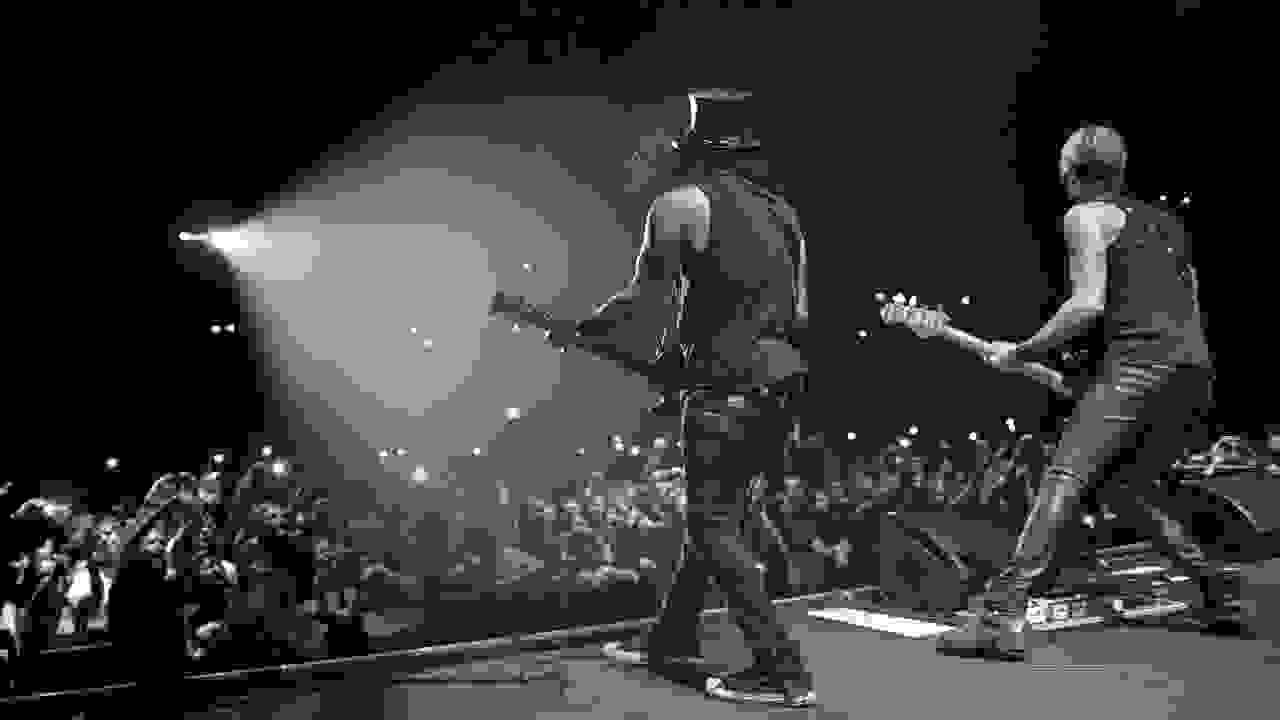
Even in a pack of platinum-selling rock stars there’s a hierarchy. If the GN’R/Def Leppard/Deep Purple axis is the main draw, then Gilby Clarke and Dave Kushner are essential back-up. The former cuts a rakish figure with his jet-black hair and Pirates Of The Caribbean beard, the latter a low-key but friendly presence whose only concession to the rock-star look is a bull-horn moustache that makes him look like a passing member of the Village People. It’s Kushner who has arguably the hardest task on stage, recreating Ritchie Blackmore’s pyrotechnics on the Deep Purple songs. “Man, that’s daunting,” he says. “I spent hours watching him on YouTube, playing his parts. But once you get into it it’s fun.”
If Kushner is the quiet man of Kings Of Chaos, then Ed Roland is the surprise package. Where the rest of the band made their name in the 80s (or, in Glenn Hughes’s case, the 70s), the Collective Soul singer is strictly a 90s proposition. His band were one of countless outfits who dominated the post-Nirvana landscape, with a string of platinum albums in the US. And although they never quite made it in the UK, they notched up several bona fide hit singles in South Africa and subsequently played here several times – indeed it was partly down to Roland’s suggestion that they ended up playing here. Even though he’s successful in his own right, the fan-boy in him is still in awe when it comes to present company.
“I was on the local crew when Def Leppard played in Atlanta in 1988,” he says. “I’ve still got the shirt. And now I’m literally running straight into Joe Elliott on stage. Guns N’ Roses were part of my musical education. What Slash does… he’s like an orchestra to me.”
And so we come to Slash. This is the first time he’s played with the Kings Of Chaos, and he’s undoubtedly one of the main draws, but it’s hard to work out his place in the scheme of things. Like Matt Sorum, he’s got a Star Lounge dressing room. But, unlike his colleagues, the guitarist largely keeps himself to himself. In the venue, he sequesters himself with his wife and their two young children. When we all go out to eat at the beachside lodge on their day off, he sits apart from everyone else. There’s no bad vibes, and certainly no attitude from him, but he doesn’t engage like the others.
You sense there are politics at play. Slash has a different manager to everyone else, meaning he’s someone else’s valuable asset, and there’s a degree of tiptoeing around him as a result. I’m instructed that, yes, he will do an interview, but there are conditions: it has to be done in tandem with Myles Kennedy, and he wants to talk about the band the two of them have together rather than Kings Of Chaos. Apparently we’re to make it clear that Slash is a Special Guest at these shows rather than an actual part of the band, though photos need to feature him in the centre. All this is unlikely to have come from the laid-back guitarist himself, though it does run counter to the “no bullshit” policy, and it certainly makes for a short, stilted interview over Caesar salad in the catering room. Here are the edited ‘highlights’.
So, Slash, what have you been up to?
Now? I came home and I started working on the Nothing To Fear movie [the horror film he’s producing], get that finished. It’s done, but I’ve just finished up the mixing and the mastering. And this ongoing working on material for our next record. Just odds and ends.
How different is this to a regular band?
It’s very different, of course. But, you know, I’ve known a lot of these guys most of my life.
Did you get a say in which songs you get to play?
Not really. Matt basically calls the shots. But we changed up everything. He had us doing a couple of songs that we ended up changing. He said, ‘Why don’t we do this instead of this, and why don’t you do this?’ For me it worked really good.
Who’s your dream signing?
Dead or alive?
Alive.
Oh, that’s not fair.
Well, you’re going to struggle to get the dead people up there.
I don’t know. It’s not that kind of a thing. I’m not that kind of a person. I don’t fantasise about what isn’t.
There are potentially a lot of egos on stage. How do you deal with that?
This isn’t about egos. It’s about having fucking fun.
Is this something you can fit around the day job? If Matt called you and said: “Do you fancy doing it again?” what would you say?
Yeah… I jam a lot, so I love to get up there with people. There is a certain amount of pressure maintaining your own group, keeping it up to snuff, keeping writing songs and so forth. And it’s your own invested interest in your own band. Whereas this is something where you just get up and play and it’s a little bit more relaxed. I love to jam because it takes me out of my comfort zone.
So is that a yes, or no?
I dunno. I guess we’ll see.
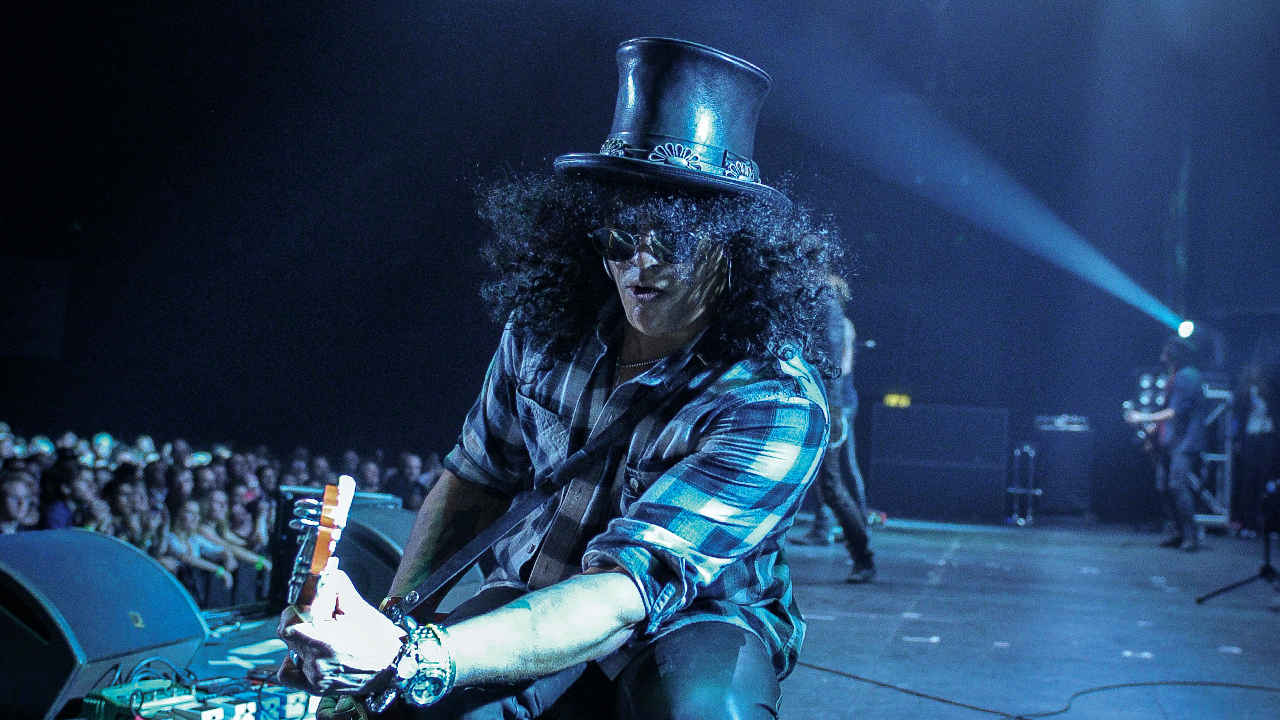
For his part, Myles Kennedy is perfectly happy to talk about being part of Kings Of Chaos. He’s the utility man, taking on the roles of Axl Rose, Scott Weiland and even, on a romp through Communication Breakdown, Robert Plant. Kennedy was a last-minute addition to the line-up, parachuting in after original choice Sebastian Bach bailed to make a reality TV show. He was juggling live commitments with Slash and working on the new Alter Bridge record when he got the call.
“It’s a mind-fuck,” he say, back in the remote outpost that is his solo dressing room. “But that’s been my whole story for the last few years.”
Kennedy is a modest man, and he knows his place in company like this. He says that he feels like the kid from Foreigner’s Juke Box Hero who starts out watching his favourite bands from the crowd then ends up joining them on stage. You can see the awe written all over his face when he sings Sweet Child O’ Mine or Paradise City.
“That’s pretty much it all of the time,” he says with a laugh. “There have been many occasions where I’ve thought, ‘Why the fuck am I here?’”
Kings Of Chaos is the third band Kennedy is involved in right now, alongside Alter Bridge and his collaboration with Slash. Is there part of him that does so much because he’s scared of it all going away?
“That’s some of it,” he says. “It took a long, long, long time to get these opportunities, and I feel like if I slow down then it’ll all disappear. And at the end of the day, I love this. It’s awesome.”
He excuses himself, saying he has to warm up. “I’ve got some crazy stuff to do,” he says. “You wouldn’t want to hear it, believe me.”
We’ll take his word for it.
If the atmosphere backstage is relaxed-verging-on-comatose, then it’s a different matter out front. There’s the kind of buzz of expectation that you only get from audiences whose thirst for this sort of thing hasn’t been slaked by familiarity. Any one of the bands involved would generate a decent level of excitement on their own; combined, it’s a no-brainer. Of the 7,000 people packed into the GrandWest each night, a good two-thirds are wearing T-shirts featuring bands whose members are on stage.
But then Kings Of Chaos have played it smart. Not only have they identified an opening for an all‑star supergroup of the A-list variety, they’ve also opted to roll it out well away from the media spotlight in Britain or America. As Joe Elliott puts it: “The critics would maul us in the UK. They’d just go ‘Why?’ When you take it to places that are more musically starved, they get it.”
It’s clear as soon the intro music gives way to Highway Star that there’ll be no maulings here. When visits by international bands are scarce, you’re not going to spend your evening flinging bottles at the stage when they do come over. It doesn’t hurt that, collectively, Kings Of Chaos have one or two hits to their name.
The show is divided up into three distinct parts, with the singers and guitarists operating on a shift system (only Sorum and McKagan remain on stage throughout). The first section is the greatest hits, the second is the pull-up-a-sofa acoustic section, the third is where they wheel out the really big guns. It’s not quite an equal split, though each artist gets their time in the sun: Velvet Revolver are represented by two songs (Fall To Pieces and Slither), Collective Soul and Deep Purple get three apiece (Heavy, Shine and World I Know from the former, Highway Star, Smoke On The Water and Burn from the latter), as do Def Leppard (Animal, Pour Some Sugar On Me and Two Steps Behind, the latter a hit in South Africa in the early noughties).
Inevitably the set is weighted towards Guns N’ Roses, who get four songs – five if you count the Gilby Clarke-fronted take on Knockin’ On Heaven’s Door. Throw in a handful of covers – Communication Breakdown, Tie Your Mother Down and All The Young Dudes – and it makes you wonder why nobody’s done this before.
Watching the assorted musicians bounce off each other (literally, a couple of times) is both reassuringly familiar and disconcertingly strange. Duff McKagan playing bass on Animal? Weird. Slash putting Communication Breakdown through the mangler? Odd. A white-coated Ed Roland squirming like a louche sous chef during Slither? Crazy. Joe Elliott, Glenn Hughes and Ed Roland pitching in with backing vocals on a triumphant Paradise City? Downright unthinkable. Yet strangely brilliant.
But then there’s the $64,000 question: isn’t this just a covers band? A world-famous, well-paid covers band, but a covers band nonetheless? Yes and no. They’re not playing original material, but at least the material they are playing is theirs. It’s not a world away from Velvet Revolver doing Guns N’ Roses and Stone Temple Pilots songs. Or, for that matter, Axl Rose and whoever is in his band this month playing old Guns N’ Roses songs.
If you think too hard about it you could turn it into an artistic moral dilemma. Alternatively, you could just get over yourself and enjoy it for what it is: a living jukebox, played by the people who wrote the songs in the first place. Or, in simple terms: a massively entertaining night out.
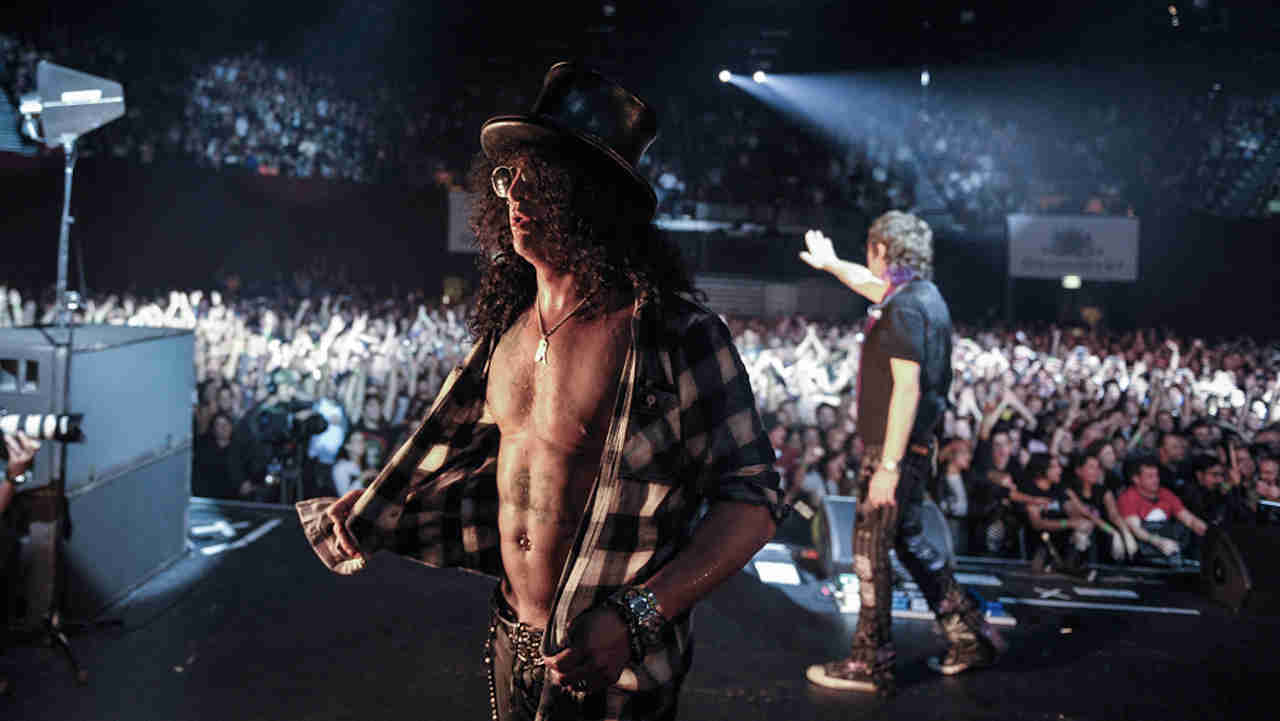
After the show, the backstage area finally comes to life. Various musicians and their families wander in and out of their dressing rooms, congratulating each other on a job well done. Joe Elliott – here without family or, it turns out, a change of T-shirt – is in characteristically effusive mood.
“See? What did I say? It’s about fun. Us, the crowd, everybody. What did you think?”
It was great, but maybe you could have thrown a few more hits in there.
“What?” he splutters, looking momentarily taken aback before his irony detector kicks in. “But that’s what people want these days. Are people crying out for a new Def Leppard album? I honestly don’t think so. Do they want to see us play Hysteria in Las Vegas? Of course they fucking do.”
And that’s exactly what Kings Of Chaos is: a hit machine. Not high art. Not even middlebrow art, if we’re being brutally honest. But a cracking time for everybody involved, audience and musicians. “At the end of the day, people will be banging on the door to do this,” co-manager Steve Wood says confidently.
In the parlance of the times, Kings Of Chaos are a brand as much they are a band. People can come, people can go. Everybody’s welcome as long as they bring their hits. With the lure of triple-headed package tours starting to fade, a proposition like this could clean up. There’s already talk of shows in the Lebanon, another of Elliott’s “musically starved” places. Schedules permitting, it wouldn’t take a huge leap of imagination to see them high on the bill at one of next year’s festivals with Steven Tyler or Chester Bennington in tow. “The more we do it, the more it’ll fall into place,” says Elliott.
Matt Sorum is already thinking ahead.
“The rappers, they do this shit all the time,” says the drummer. “Dr Dre goes out with Eminem, Jay-Z goes out with Kanye West, they hang out, they do their thing. The Stones did it in the 60s with the Rock’N’Roll Circus.”
He busts out that Californian smile once again. “We like each other, we like playing rock’n’roll, we like mixing it up. It’s not that difficult to understand.”
Originally published in Classic Rock 187, August 2013
